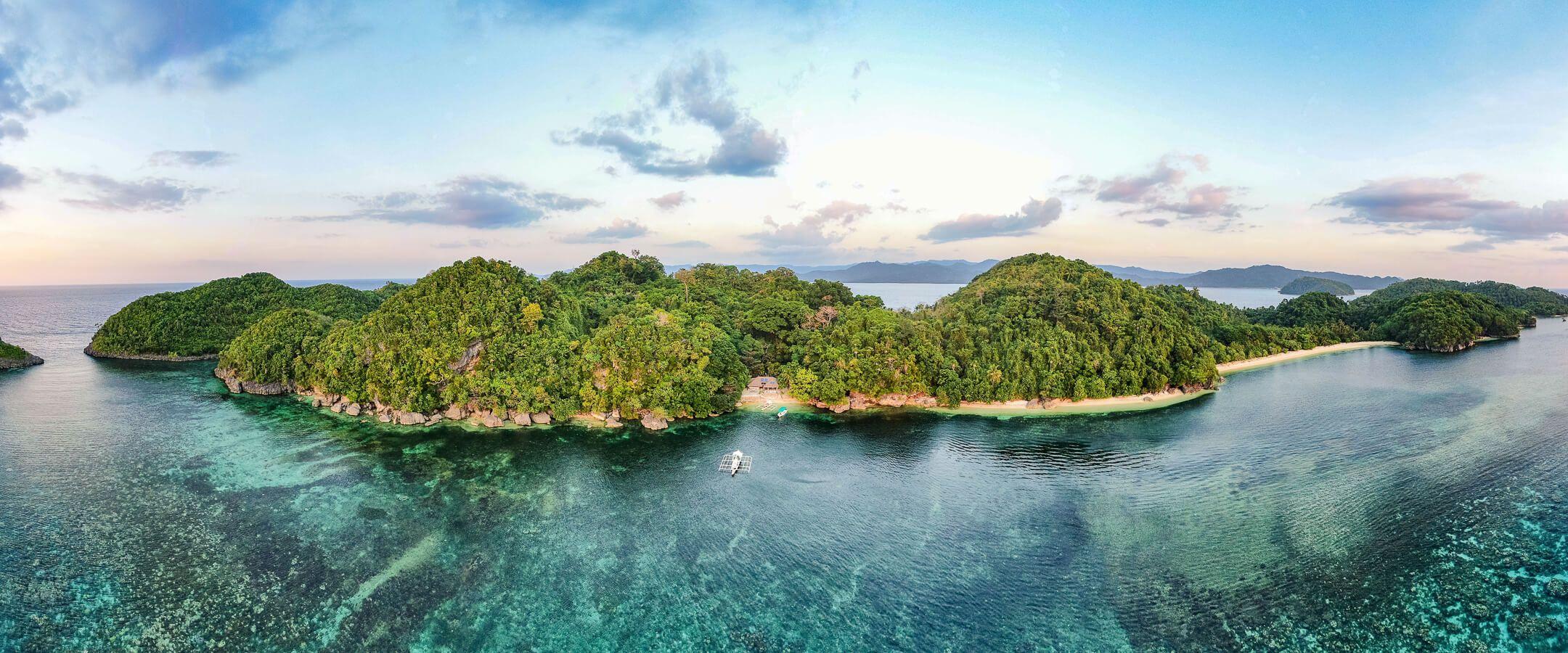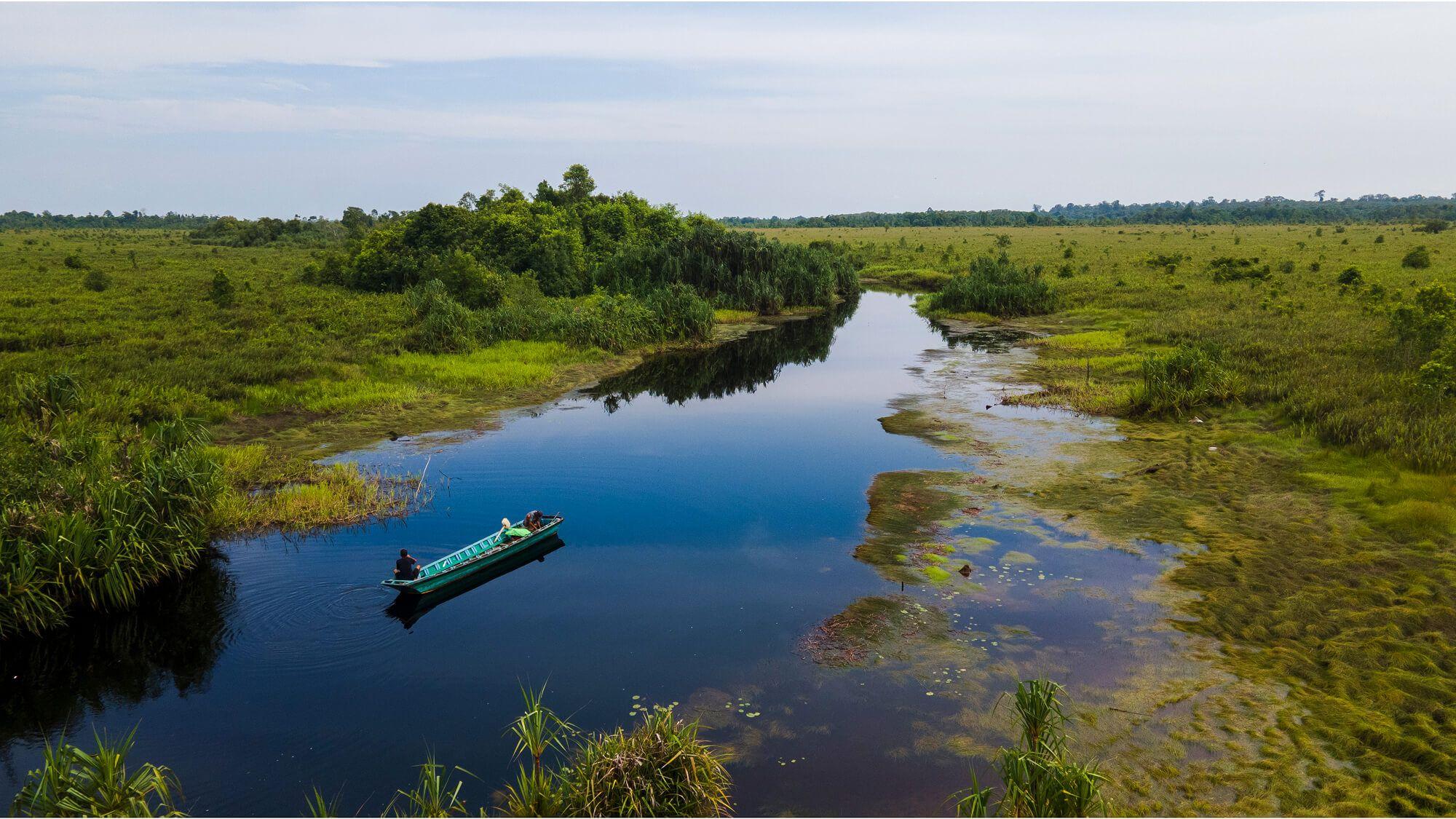Rewilding our Souls in the Great African Seaforest
Off the coast of Cape Town, a great underwater wilderness beckons. Under the Sea Change Project, an amphibious group of Oscar-winning storytellers and scientists keep a sacred promise to the world’s only giant bamboo kelp underwater forest. Their pact? Visit the kelp forest every day, share the untold, magical tale of her wonders and remind us all of one truth – we are wild.
Swati Thiyagarajan was no stranger to forests. She’d just spent over two decades reporting on countless ecosystems across South Asia and Africa as a pioneering wildlife journalist and filmmaker.
But it was the first time she swam through giant bamboo kelp that Swati found herself able to soar through a forest canopy. She felt like a bird, and it was all thanks to the gift of the kelp.
“People don’t think that there is a forest in the ocean,” says Swati. “This is as much as the Amazon, except it’s the Amazon underwater.”
Amidst misty, blue-green waters off the coast of Cape Town, she wove through the golden fronds and towering silhouettes of giant sea bamboo, or Ecklonia Maxima. A species of brown seaweed that can grow up to 15m. Sea bamboo consists of a holdfast - a root-like structure that anchors to rocky sediment on the ocean floor, an air-filled, stiff stipe that towers upward with fronds near the surface that photosynthesise.
“You can pull yourself down on the stipes, and there’s this extraordinary, three-dimensional forest all around you. You can feel the kelp fronds go over your skin as you're swimming,” she says.
This is the Great African Seaforest (GASF), the world’s only giant bamboo kelp forest, stretching for over 1000 km from Cape Town to the coastlines of Namibia - also humanity’s ancestral shores. These waters are home to a breathtaking abundance of biodiversity, including sharks, rays, octopuses, and other invertebrates.
The GASF is also home to The Sea Change Project, an Oscar-winning group of storytellers and scientists who have brought incredible scenes of ocean life to millions around the world. Their nonprofit environmental storytelling and ocean conservation organisation, of which Swati is a core member, is raising the profile of kelp forests globally.
Together, they’re diving into unknown depths, uncovering the story of the ocean.
A Trailblazer of Wildlife Storytelling
Watching the captivating scenes of David Attenborough’s 1979 documentary, Life on Earth, when it was released, little Swati’s imagination was ignited. “I would love to do that,” she thought. Her love for nature had already blossomed as a toddler, growing up in the lush coastal city of Chennai, but the world’s kaleidoscope of biomes remained an alluring mystery.
“Growing up at that time in India, 50 years ago, as a little Indian girl, you didn’t think that there were international options for you.”
Nevertheless, in 1997, she became an award-winning journalist at the national NDTV network and went on to change the face of environmental coverage in India. From 2003 to 2018, Swati helmed the longest-running conservation show on a news channel – Born Wild. With an all-female crew, Swati spent years travelling through the most remote corners of the Indian subcontinent, navigating alpine outcrops, marshy deltas, salt plains and dense tropical forests to bring the stories of endangered species and wildlife to millions of Indians.
“I really got the environment going on the news. And we did help with policy, and we helped with awareness, and we helped with a lot of things around the country at the time through environmental reporting,” Swati explains.
The ocean, however, had remained a lifelong mystery, owing to a near-drowning experience she had at the age of six. “I had a real mental block and absolute fear when it came to the ocean and water,” she says.
Nevertheless, when she married South African filmmaker Craig Foster and moved to Cape Town in 2008, she took the plunge and began diving. The seaforest had slowly begun to put down holdfasts in her heart. “Anytime that I felt slightly panicked or I could feel myself getting agitated, I could just hold the kelp, and then you could just lie on it almost like you were lying on a raft, and it would just sway slightly, holding you, and it was the most extraordinarily comforting feeling ever.” She smiles.
Once she formed that bond, she became part of the Sea Change project, which Craig had co-founded in 2012 to help raise awareness. “We realised that this particular ecosystem was globally completely unknown,” says Swati.
“It is an organisation that is inspired by nature,” she explains. With their very first film, My Octopus Teacher, they won the Oscar for Best Documentary Feature at the 2020 Academy Awards.
The organisation’s work emerges from a unique, fundamental practice – a daily dive into the Great African Seaforest by each team member. This ritual was started years ago by Craig Foster when he returned to his childhood shores and made a special promise.
A 21st Century Explorer in Forgotten Forests
In 2008, the Great African Seaforest was a nameless, relatively unknown entity. But when Craig started to freedive daily amidst the kelp in the icy waters off Cape Town, seeking solace amidst a difficult period, the relationships that blossomed would one day captivate the world.
“Because he'd spent time with the San people [of the Kalahari desert], he realised that the only way to learn and know an ecosystem is to actually be in it every day. So, he made a promise that he would dive every single day for ten years and not miss a single day.”
As the seaforest unveiled her wonders to him, he naturally began to document the extraordinary sights – the inner lives of numerous shark, ray and invertebrate species. When he held an exhibition on Cape Town’s Sea Point promenade featuring these photos, it reached over a million people, many of whom were caught unaware. “We gave it a name, the Great African Seaforest, just to give it an identity, so you can relate to it.”
Mentored by Emeritus Professor Charles L. Griffiths from the University of Cape Town’s marine biology department, and diving with PhD student Dr Jannes Landschoff to help document this little-studied ecosystem, Craig began to make breakthroughs with his tracking practice. He personally discovered eight new species and formed a rare bond – a friendship with a female octopus.
That's when that switch happened. And I was like, I have to do this. Like I have to be able to swim. I have to be in the water every day. For me, it was as if the ocean was calling. There was some messaging there that I said, ‘Okay, I'm getting it. I'm coming.
In 2019, two whales were discovered to have drowned in False Bay, Cape Town, from entanglement in octopus fishing lines. The incident had generated a furore; Swati and the Sea Change team were part of the carcass retrievals and also wrote articles covering the tragedy. “It was a horrible sight. Everybody felt bad.”
Months later, the government banned those fishing lines until they could be designated whale-friendly, saving cetacean lives that season. In the week after the decision, Swati was visited by both a juvenile humpback whale and a Southern Right whale in shallow waters – incredibly rare sights individually, but in close succession, almost unprecedented.
“That's when that switch happened. And I was like, I have to do this. Like I have to be able to swim. I have to be in the water every day,” recounts Swati. “For me, it was as if the ocean was calling. There was some messaging there that I said, ‘Okay, I'm getting it. I'm coming.’”
Meanwhile, their next project was germinating. “We have all this footage of the octopus. Should we make a film with it?”
To Remember Our Wildness
At the height of the COVID-19 pandemic, Swati and the team watched from home, incredulous, as the most prestigious film awards honoured their documentary. Thanks to the Oscar and the BAFTA awards, kelp was now growing on the world stage, and the octopus was a global celebrity.
“I just couldn't believe it, honest to God,” she says. Theirs was a wildlife film that transcended genres – with an unprecedented central focus on the personal relationship between a human and a wild aquatic animal. “It broke all sorts of rules and moulds up until then that were followed in wildlife films and creatively just stood out.”
“All of us know this. The only thing that motivates us, the only time we stop being selfish, the only time we wish for the best for someone else and not for ourselves, is when we love - it's just that simple.”
You're a carbon-based life form. Every breath you take, every bit of food that you eat, every bit of water that you drink, is still predicated on the natural world. We have forgotten that we are a part of nature, that we are nature, that we are the human animal, that nature is our original home. Our thing is to constantly make you remember that you are wild.
This love for nature is a trait that unites every member of the Sea Change project. “Somehow, the one thing we all kind of carried with us as an intrinsic truth was that we are wild.” Their stories emerge organically from their daily submarine communications with the seaforest, embedding deep threads of integrity and authenticity into their work.
However, their mission extends beyond the kelp forests. They aim to help us recover from our damaging fragmentation from the natural world.
“You're a carbon-based life form. Every breath you take, every bit of food that you eat, every bit of water that you drink, is still predicated on the natural world,” says Swati. “We have forgotten that we are a part of nature, that we are nature, that we are the human animal, that nature is our original home. Our thing is to constantly make you remember that you are wild.”
Part of this journey of reconnection, according to the team who practice it every day, is immersing ourselves in nature – putting down our phones or laptops and going for walks, swims and a moment of quiet amidst living green or blue.
Bringing about a Sea Change
“It's been five years since the release [of My Octopus Teacher] and we still get thousands and thousands of emails and posts and people just saying how it's changed their lives, how they've stopped eating octopus, how somebody's become a marine biologist, the messages we get from kids. I mean, it’s just wonderful.”
They have worked on multiple films, books and exhibitions since, also collaborating with global organisations on matters of policy. Their works include a children’s book, A Journey Under the Sea, Craig Foster’s new book, Amphibious Soul, and an upcoming 1001 Seaforest Species app.
Kelp, found along over a third of our world’s coastlines, is designated as one of nine key ecosystems to regenerate ocean health by 2050. Kelp offers homes, nurseries and food to thousands of species, acts as one of the world’s most productive carbon sinks, produces oxygen and slows coastal erosion.
Nevertheless, kelp forests are declining globally, beset by threats that include warmer waters due to climate change, overfishing, coastal development and increasing storm intensity. Tasmania, where sea surface temperatures have increased at four times the average global rate, lost over 95% of its giant kelp forest due to marine heatwaves, and California saw its kelp habitat decimated by sea urchin overgrazing and climate change.
“We all know about coral bleaching, but we don't think about how warm waters kill the kelp,” says Swati. “There are summers when it's very concerning because you'll get like 20-30 days sometimes of excess heat in the water. And the water's never been that hot. You can literally see the kelp taking strain. You'll see the fronds getting all limp, holes forming, and you can just see it disintegrating.”
For Swati and the team at the Sea Change project, it’s a matter of pushing for preservation, restoration and regeneration of the Great African Seaforest while it is still thriving. “Ultimately, we're all working for one goal, which is just a healthy ocean for all in the world. If we have healthier oceans, it's one of our greatest mitigation, adaptation that we can do for climate change.” They’ve joined hands with the Global Kelp Forest Alliance, which aims to protect and restore 4 million hectares of kelp forest by 2040.
Following My Octopus Teacher, their team has continued to work on films that explore the deep relationships between nature and humans, including Mother Nature in the Boardroom (another collaboration with Jane Goodall), Older Than Trees, and Pangolin: Kulu’s Journey.
In one encounter during Craig’s daily dive, now documenting its 1001 seaforest species, an octopus swam off with his camera.
As it explored the unfamiliar object with its 2000 independent suckers, the camera was pointed at Craig – a fascinating glimpse into the view of the forest’s inhabitants as they witness the team’s clockwork arrival. The 1001st seaforest species, the team decided, would be us - homo sapiens.
“That is the biggest lesson you can learn. You’re not visiting, even if you’re in the ocean,” Swati explains.
“This is home.”
Most Popular
The Climate Tribe delivers stories about Biodiversity and Conservation, Circular Economy, Food and Water , and how they intersect with climate.
Subscribe
Get the latest stories inspiring climate action around the globe straight to your inbox.






